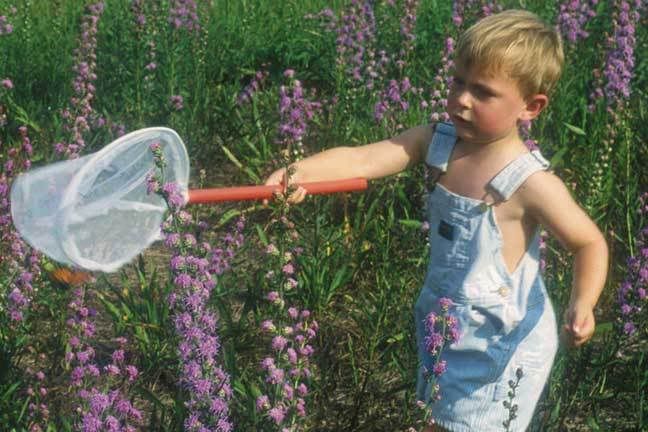In fact, it's receiving very little attention for such an important and necessary variable in the education system. Especially in San Diego.
More specifically, the training for special education aides is not given enough attention. The Voice of San Diego has an article about the growing need for special education and lack of training for special education aides.
This reminds me of a very good friend of mine, Phoebe. She's from a completely different generation, much further on in her life, and she is one of the smartest people I know. She got her degree in art and later decided she wanted to work with children, specifically those with "special needs" -- I believe she works with both hearing- and sight-impaired preschoolers. She loves it and recommends it to anyone.
I, too, have worked with special needs children, though I did not receive any special training or even any warning, for that matter. I worked at a middle school last summer as a "youth development specialist," a fancy title for a 6-to-6 aide. However, a large portion of the children had some kind of mental or learning disability, and I found working with them very enjoyable.
How much extra training do you think is really necessary? Are today's aides competent? Should these special children be separated from "normal" kids?
Kids Together Inc. is a great resource for parents and teachers of children with disabilities and the issues revolving around inclusion, or mixing them into "normal" classes
Tuesday, February 26, 2008
Monday, February 25, 2008
The keyboard is the future
Initially, this post was to be about the importance of learning how to type on a "QWERTY" keyboard.
Remember learning cursive in elementary school and hearing about how you would need to know cursive in middle school because they don't let you print? Yeah, that was a lie. But typing is something that is increasingly important, what with laptops, the fact that nearly everything is on the Internet, etc. etc. So I think that typing should be a priority in academia.
I learned how to type in the sixth grade in a computer enrichment class that used the Mavis Beacon program. That was probably one of the most simple and helpful programs, and I'm sure it still is, with its upgrades and later editions.
Another site I stumbled across is BBC's "typing school," an online typing school geared toward children ages 7 and older, featuring brightly colored sea animals and a "dance mat."
I had no idea that the BBC had all kinds of schools, aimed at pre-schoolers, grade-schoolers and high schoolers. There is a wide array of subjects, too, from science and literacy to business and art.

(Photo from BBC's schools homepage)
Remember learning cursive in elementary school and hearing about how you would need to know cursive in middle school because they don't let you print? Yeah, that was a lie. But typing is something that is increasingly important, what with laptops, the fact that nearly everything is on the Internet, etc. etc. So I think that typing should be a priority in academia.
I learned how to type in the sixth grade in a computer enrichment class that used the Mavis Beacon program. That was probably one of the most simple and helpful programs, and I'm sure it still is, with its upgrades and later editions.
Another site I stumbled across is BBC's "typing school," an online typing school geared toward children ages 7 and older, featuring brightly colored sea animals and a "dance mat."
I had no idea that the BBC had all kinds of schools, aimed at pre-schoolers, grade-schoolers and high schoolers. There is a wide array of subjects, too, from science and literacy to business and art.

(Photo from BBC's schools homepage)
Wednesday, February 20, 2008
Play is more important than being fit or smart
 It's no secret — and certainly not new news — that Gov. Arnold Schwarzenegger wants California kids to be fit.
It's no secret — and certainly not new news — that Gov. Arnold Schwarzenegger wants California kids to be fit.In 1990, former President George Bush appointed Gov. Schwarzenegger Chair of the President's Council on Physical Fitness and Sports, where he traveled the 50 states to address the need for more after-school alternatives. In 2002, he victoriously supported Proposition 49, the After-School Education & Safety Act.
Now, Irvine Company Chairman Donald Bren is donating $8.5 million to THINK Together, a non-profit after-school provider serving about 20,000 students at more than 180 sites in school districts throughout Los Angeles, Orange, Riverside and San Bernardino counties. It offers academically enriching afterschool programs that receives funds from Prop 49 and is endorsed by Schwarzenegger.
In the article from Business Wire, Schwarzenegger says:
“I’ve always been a big believer in after-school programs.
"The danger zone for kids is from 1 o’clock to 6 o’clock, because that’s when they are often unsupervised. That’s when they can get into all kinds of trouble with gangs and drugs, if no one is paying attention to them.
“This funding by Donald Bren will make a substantial positive difference for thousands of students. Facts show that high-quality, well-organized after-school programs help kids do better work in the classroom.
“The students in Santa Ana and Eastern Los Angeles County now have a brighter future, because of the guidance they will receive with THINK Together and the opportunity to have something positive and productive to do after school.”
 However, if children are too bombarded with academics or forced activities after they've already been in school all day, it has the potential to seriously inhibit their individuality.
However, if children are too bombarded with academics or forced activities after they've already been in school all day, it has the potential to seriously inhibit their individuality.Jean Piaget, late and renowned Swiss psychologist, believes that play is an important part for developing children. In an article in TIME Magazine, more about Piaget and his work is described.
I say, let the children play ... as long as they're in a safe environment with good, trustworthy people/friends, they shouldn't be forced to sit through yet another class or play a sport they're not interested in after being in school all day.
*Arnold picture from allposters.com; Piaget picture from notablebiographies.com
Labels:
activities,
after school,
children,
piaget,
play,
schools,
schwarzenegger
Gendered classrooms promote stereotypes
I sort of stumbled into the women's studies department because I was looking for an upper-division GE class that would satisfy the cultural requirement here at SDSU. I took a class, enjoyed it enough and needed a minor — and my teacher happened to be the head of undergraduate studies — so I got myself signed into the minor.
In the many women's studies classes I've taken since then, we've learned about the sexism and bias in everything from science to media. For instance, in my "Women in Media" journalism elective, taught by Martha Lauzen, we learned that, initially, young boys and girls do develop different skills at different rates. This is why, generally, boys tend to be better at math than girls, who are usually better at English. This is only because they develop the skills necessary for those subjects at different times and often pursue what they're better at. But if girls were encouraged to keep practicing their math skills, for instance, there is no proof that men will always inherently be better at the subject.
You get the idea.
Now, in trying to find a story about Philadelphia middle schools switching back to the elementary-school-style, one-classroom-all-day model, I found a story instead about gendered classrooms. A man named David Chadwell thinks that boys and girls will learn better separately. He uses "theories" such as boys don't hear as well as girls as proof that this is a good thing.
This kind of separation in public schools seems ridiculous because it promotes the idea that girls and boys are different and that they can't learn the same things equally.
In the many women's studies classes I've taken since then, we've learned about the sexism and bias in everything from science to media. For instance, in my "Women in Media" journalism elective, taught by Martha Lauzen, we learned that, initially, young boys and girls do develop different skills at different rates. This is why, generally, boys tend to be better at math than girls, who are usually better at English. This is only because they develop the skills necessary for those subjects at different times and often pursue what they're better at. But if girls were encouraged to keep practicing their math skills, for instance, there is no proof that men will always inherently be better at the subject.
You get the idea.
Now, in trying to find a story about Philadelphia middle schools switching back to the elementary-school-style, one-classroom-all-day model, I found a story instead about gendered classrooms. A man named David Chadwell thinks that boys and girls will learn better separately. He uses "theories" such as boys don't hear as well as girls as proof that this is a good thing.
This kind of separation in public schools seems ridiculous because it promotes the idea that girls and boys are different and that they can't learn the same things equally.
Wednesday, February 13, 2008
Not your typical fundraiser
We surely all can remember being propositioned by a third-grader to buy cookie dough, or maybe the sixth-graders down the street knocked on your door to ask if you'd like to buy some magazine subscriptions.
Usually, public schools encourage their students to sell such products to raise money for the school, or maybe it's a particular program at the school. Well, in light of the water crisis affecting the southwest and Southern California, some Inland Empire schools are selling drought-tolerant mini-gardens that also attract butterflies and songbirds. The program is a pilot project of Cal State San Bernardino's Water Resources Institute, according to the article in Press-Enterprise's Inland News section.
The article notes that parents often learn about conservation efforts and issues, such as recycling, through their children. This is just one more way children can help educate those around them of how to help not only the environment, but also how to save money and protect our dwindling resources. Perhaps some San Diego schools could implement this fundraising program.
The Gardener's Supply Co. lists some of its readers' favorite drought-tolerant plants on its Web site.
One problem with the plants, though, that PE's article says needs to be addressed with buyers, is that the plants need a lot of water and should be planted before the dry heat waves come in around May.

Butterfly weed (Asclepias tuberosa)
Photo from www.gardeners.com
Usually, public schools encourage their students to sell such products to raise money for the school, or maybe it's a particular program at the school. Well, in light of the water crisis affecting the southwest and Southern California, some Inland Empire schools are selling drought-tolerant mini-gardens that also attract butterflies and songbirds. The program is a pilot project of Cal State San Bernardino's Water Resources Institute, according to the article in Press-Enterprise's Inland News section.
The article notes that parents often learn about conservation efforts and issues, such as recycling, through their children. This is just one more way children can help educate those around them of how to help not only the environment, but also how to save money and protect our dwindling resources. Perhaps some San Diego schools could implement this fundraising program.
The Gardener's Supply Co. lists some of its readers' favorite drought-tolerant plants on its Web site.
One problem with the plants, though, that PE's article says needs to be addressed with buyers, is that the plants need a lot of water and should be planted before the dry heat waves come in around May.

Butterfly weed (Asclepias tuberosa)
Photo from www.gardeners.com
Labels:
conservation,
drought,
drought-tolerant,
fundraising,
inland empire,
plants,
san diego,
schools,
water
Lessons from the zoo
 The Education Department's mission is to increase the knowledge and appreciation of animals and plants in people of all ages through a wide variety of educational programs and services.—www.sandiegozoo.org
The Education Department's mission is to increase the knowledge and appreciation of animals and plants in people of all ages through a wide variety of educational programs and services.—www.sandiegozoo.org On the San Diego Zoo's Web site, there is a link to an "Education" section. This part of the site is a helpful resource to teachers and parents alike, or even kids who want to get involved in learning about and helping wildlife. When I was in elementary school, I was part of the Sydney's Koala Club (or the kids' version of the Zoological Society of San Diego membership), and was quite active in saving the rainforests through letters I mailed out to who knows where.
On the San Diego Zoo's Web site, there is a link to an "Education" section. This part of the site is a helpful resource to teachers and parents alike, or even kids who want to get involved in learning about and helping wildlife. When I was in elementary school, I was part of the Sydney's Koala Club (or the kids' version of the Zoological Society of San Diego membership), and was quite active in saving the rainforests through letters I mailed out to who knows where. The point of all this is, activism or simply a project here and there can be very valuable to children in a number of ways. First of all, they're learning more than Hannah Montana's latest song lyrics or which video game has the most violence. Second, in this age of "going green," it's important for youth to have an appreciation of the species we are trying to protect — from plants and animals, to recycling our cans, bottles and papers. Finally, being involved in a project, such as those offered through the San Diego Zoo, can help children make friends and feel a part of a community, helping to build self-esteem and an identity.
The point of all this is, activism or simply a project here and there can be very valuable to children in a number of ways. First of all, they're learning more than Hannah Montana's latest song lyrics or which video game has the most violence. Second, in this age of "going green," it's important for youth to have an appreciation of the species we are trying to protect — from plants and animals, to recycling our cans, bottles and papers. Finally, being involved in a project, such as those offered through the San Diego Zoo, can help children make friends and feel a part of a community, helping to build self-esteem and an identity.For more information on the types of information and programs offered through the San Diego Zoo and Wild Animal Park, visit the Education section of the zoo's Web site, or call (619) 557-3962.
Visit the Zoo Blogs or check out the Photo Journal to see what it's like to be involved with the zoo.
Photo credits:
1) Koala (sandiegozoo.org)
2) Recycling symbol (vims.edu)
3) Child in garden (prairienursery.com)
Labels:
animals,
education,
helping,
plants,
san diego,
volunteering,
wild animal park,
wildlife,
zoo
Wednesday, February 6, 2008
Why take education outside?
Living in San Diego provides so many unique opportunities in education. Whether you're a parent or teacher looking for a creative way to teach your children/students something, or you're an adult who's looking to gain more knowledge in a subject that interests you, a plethora of opportunities are right here in San Diego.
Here, we have the beaches, mountains and desert at our fingertips, as well as museums, schools, zoos and aquariums to help further educate us on our surroundings. Diverse, populated communities, such as North Park and Downtown are home to Balboa Park and a handful of great museums and cultural experiences. Unincorporated communities, such as Alpine, Palomar and Campo offer the chance to learn about our Indian reservations, astronomy and regional plant and animal life.
Here, we have the beaches, mountains and desert at our fingertips, as well as museums, schools, zoos and aquariums to help further educate us on our surroundings. Diverse, populated communities, such as North Park and Downtown are home to Balboa Park and a handful of great museums and cultural experiences. Unincorporated communities, such as Alpine, Palomar and Campo offer the chance to learn about our Indian reservations, astronomy and regional plant and animal life.
Subscribe to:
Comments (Atom)
